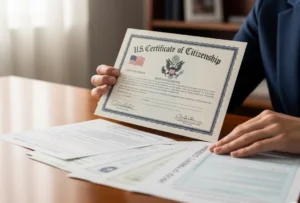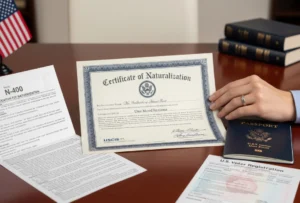Certificate of Citizenship vs. Certificate of Naturalization: Key Differences Explained
When it comes to proving U.S. citizenship, two important documents often come into discussion, the Certificate of Citizenship and the Certificate of Naturalization. Both confirm that an individual is a U.S. citizen, but they are issued under different circumstances and have distinct application processes. Knowing the difference between a certificate of citizenship vs naturalization helps you apply for the correct document and avoid unnecessary delays.
What is a Certificate of Citizenship?
 A Certificate of Citizenship is given to individuals who automatically acquire or derive U.S. citizenship through their parents rather than through the naturalization process. This applies to people who were born abroad to U.S. citizen parents or obtained citizenship while they were minors through their parents’ naturalization.
A Certificate of Citizenship is given to individuals who automatically acquire or derive U.S. citizenship through their parents rather than through the naturalization process. This applies to people who were born abroad to U.S. citizen parents or obtained citizenship while they were minors through their parents’ naturalization.
Key aspects of a Certificate of Citizenship include:
- It proves U.S. citizenship without undergoing the naturalization process.
- Applicants must show proof of their parents’ citizenship and their legal relationship to them.
- To obtain it, you need to file Form N-600 with U.S. Citizenship and Immigration Services (USCIS) and provide supporting documentation like birth certificates and parents’ citizenship evidence.
This document is especially important for individuals born outside the United States who need an official record of their citizenship for passports, federal employment, or legal purposes.
What is a Certificate of Naturalization?
 A Certificate of Naturalization is issued to lawful permanent residents (green card holders) who become U.S. citizens through the naturalization process. This process includes meeting residency requirements, demonstrating good moral character, passing an English and civics test, and taking the Oath of Allegiance.
A Certificate of Naturalization is issued to lawful permanent residents (green card holders) who become U.S. citizens through the naturalization process. This process includes meeting residency requirements, demonstrating good moral character, passing an English and civics test, and taking the Oath of Allegiance.
Key points about a Certificate of Naturalization:
- It is issued after completing the naturalization process.
- Applicants must submit Form N-400, attend biometrics appointments, and complete an interview with USCIS.
- It serves as proof of citizenship for obtaining a U.S. passport, voting in federal elections, and qualifying for federal jobs or benefits.
Unlike a Certificate of Citizenship, a Certificate of Naturalization requires active participation in the naturalization process and meeting specific eligibility requirements.
Certificate of Citizenship vs Certificate of Naturalization – Main Differences
Although both certificates prove citizenship, the difference lies in how the status is obtained:
- Certificate of Citizenship: Granted to individuals who automatically acquired or derived citizenship by birth or through parents.
- Certificate of Naturalization: Granted to lawful permanent residents who successfully complete the naturalization process.
Both documents serve the same legal purpose but follow different eligibility and application routes. If you automatically acquired citizenship, applying for a Certificate of Naturalization would be unnecessary and vice versa. Understanding these distinctions ensures that you pursue the correct document and avoid extra fees or processing delays.This comparison highlights the key differences in the certificate of citizenship vs naturalization process.
Certificate of Naturalization vs Citizenship – Are They the Same?
It is common for people to confuse the terms citizenship and certificate of naturalization. Citizenship refers to your legal status as a U.S. citizen. A certificate, on the other hand, is the document that proves this status.
For example, if you were born in the United States, you are already a U.S. citizen by birth and generally do not need any certificate. However, if you were born abroad or became a citizen later, you might require one of these certificates to serve as official proof for legal matters, employment, or travel.Understanding the difference in the certificate of citizenship vs naturalization helps ensure you obtain the correct document for your situation.
The certificate of naturalization is simply evidence, while citizenship is the underlying legal status, the two terms are related but not the same.
Why Understanding Certificate of Citizenship vs Naturalization Matters?
Knowing the difference between a certificate of naturalization vs certificate of citizenship can save you time and prevent costly mistakes. Many people apply for the wrong certificate because they do not understand the eligibility criteria. Choosing the incorrect application could lead to delays, wasted fees, and legal complications. Understanding the process of certificate of citizenship vs naturalization is essential to avoid these issues.
For instance:
- If you were born abroad to U.S. citizen parents but mistakenly apply for naturalization, USCIS will reject the application.
- If you are a permanent resident who needs to naturalize but apply for a Certificate of Citizenship instead, your request will also be denied.
The correct certificate ensures you have valid proof of citizenship for applying for passports, sponsoring family members, working in federal positions, and participating fully as a U.S. citizen.
How Alo Legal Can Help You?
The application process for either certificate can be confusing, especially when it comes to gathering proper evidence and meeting USCIS requirements. At Alo Legal, our team has extensive experience assisting individuals in navigating the complexities of U.S. citizenship documentation.
Whether you need help filing Form N-600 for a Certificate of Citizenship or Form N-400 for Naturalization, our experts guide you through every step. We ensure your documentation is accurate, help you avoid common mistakes, and prepare you for interviews or evidence requests.
We also analyse your specific situation to confirm eligibility before you file. This saves time, money, and ensures your case is handled efficiently. Alo Legal serves as your trusted partner for all legal documentation needs related to citizenship.
Conclusion
Both the Certificate of Citizenship and Certificate of Naturalization serve as proof of U.S. citizenship, but the way you qualify for each is different. One is for individuals who automatically acquired citizenship by birth or through parents, and the other is for those who obtained citizenship through naturalization.
Understanding these differences is crucial when applying for passports, federal jobs, or handling legal matters. If you are unsure which certificate applies to your situation, professional guidance can make the process smooth and stress-free. Alo Legal is here to help you confidently obtain the right document and secure your future as a U.S. citizen. Their experts can assist you in navigating the certificate of citizenship vs naturalization decision with ease.







